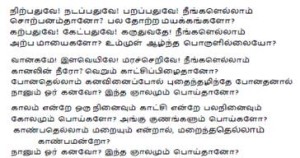By Kollengode S Venkataraman
Subramania Bharati, (1882 –1921), simply called Bharatiyaar out of love and reverence by the Tamils, is the bench mark in Tamil literature, particularly in poetry. His impact is so profound that Tamil poetry today is seen as Pre-Bharati and Post-Bharati.
His full name is Chinnaswamy Subramania Aiyar. Bharati, meaning “one endowed with the blessings of Saraswati, the Goddess of Knowledge†is the title he received for his poetical skills when he was barely eleven.
His was a multifaceted personality. He was a freedom fighter, poet, essayist, journalist, social reformer, linguist… He spoke passionately on the emancipation of women, untouchability, social equality…
Despite his great gift, he died in 1921 in penury, with his cremation attended by only a handful of people. He was 39. He was deeply religious and spiritual. He made Tamil poetry — till that time, a topic only among the Tamil vidwans (scholars) -– enjoyable for all the Tamil-knowing people, whether urban or rural, educated or uneducated, rich or poor. He was also a Brahmin. Despite Bharatiyaar’s great contributions to Tamil literature, there was, and still is, ambiguity among many of the powerful leaders of the anti-Brahmin and obsessively Tamil-loving Dravidian Movement to recognize Bharatiyaar for his gift to the Tamils as a people, and to Tamil as an old classic language in every sense of the terms “Classic” and “Old.”
Bharatiyaar wrote a famous and popular song, Aaduvomay pallu paaduvomay… (“Let’s dance to folk tunes declaring, ‘We got the blissful freedom…’â€) on the joy of Indians celebrating freedom. He wrote this poem prophetically more than 25 years before India’s independence. His life was recently filmed in the biopic Bharati portraying his life realistically.
Bharatiyaar also wrote on philosophy in verses conforming to the rules of poetry, and also in free style. Here is one of his poems on the illusory and transient nature of life, first in the Tamil script, and then as a free-style translation.
This song was nicely portrayed in the biopic on his life, with Ilayaraja scoring the music. The song is available on this link: https://www.youtube.com/watch?v=nx91opkZ09I.
Here is a free-style, non-literary, but truthful translation:
O, You, standing still*, or moving on your feet*, or flying on wings*!Â
Are you all only dreams? Are yours only phantom appearances?
O, all that we study, learn, listen, and contemplate,
Are you only trivial illusions? Don’t you have any deeper meaning?
O, the open skies, the gentle sunshine, and trees in the woods!
Are you all a mirage? Just errors of my hallucination?
All that have gone-by just vanished, buried as in dreams,
So, am I also a dream? Is this world also unreal?
The idea of time, and the scenes reminisced from memory,
Are these only mental tricks? And their features are lies too?
If everything seen will disappear, and all that vanished were once seen,
Am I also only a dream? Is the world around me is a fantasy too?
* Reference to plants, animals, and birds.
———-Â
Bharatiyaar raises these questions without trying to answer them. He probably wants readers to seek answers for these eternal questions from their own life journey. One does not have to be old to pursue this. After all, Bharatiyaar was only in his 30s when he wrote this poem. Even high school students entering college can ponder over these queries with their own adolescent experiences. Others can look at them against the background of their successes and disappointments in their careers, love and married life, social climbing, material acquisitions, and get better insights into life’s quirks and complexities.  ♦


